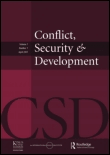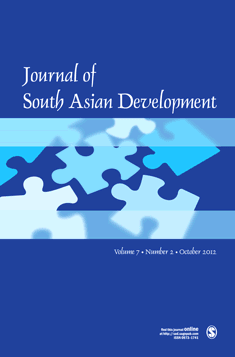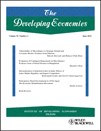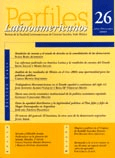
STUDIES IN COMPARATIVE INTERNATIONAL DEVELOPMENT
Scope & Guideline
Illuminating Paths to Progress in Global Development
Introduction
Aims and Scopes
- Comparative analysis of development practices:
The journal seeks to understand how different countries and regions implement development strategies, drawing comparisons to identify best practices and lessons learned. This involves examining case studies and theoretical frameworks that elucidate the factors influencing development outcomes. - Political economy of development:
A core focus is on the interplay between political structures and economic processes, highlighting how governance, policy, and institutional arrangements affect development trajectories. The journal explores issues such as state capacity, authoritarianism, and the role of civil society in shaping development. - Globalization and its impacts:
The journal examines the effects of globalization on development, including how international trade, foreign direct investment, and transnational networks influence local economies and societies. It analyzes both the opportunities and challenges posed by global economic integration. - Social justice and equity:
A strong emphasis is placed on social issues related to development, including the impacts on marginalized groups, gender equality, and human rights. The journal aims to contribute to discussions on how development can be inclusive and equitable. - Environmental governance:
The journal looks at the intersection of development and environmental sustainability, assessing how policies and practices can balance economic growth with ecological preservation. Topics include climate change, resource management, and the role of local communities in environmental governance.
Trending and Emerging
- Digital activism and governance:
There is a growing interest in the role of digital technologies and social media in facilitating activism and governance. Papers exploring how digital discursive practices shape political mobilization and state repression are becoming increasingly prominent. - Environmental and climate justice:
Research focusing on the intersection of environmental issues and social justice has gained traction. This includes studies on community-led environmental governance and the implications of climate change for vulnerable populations, reflecting a heightened awareness of ecological crises. - Transnational civil society and advocacy:
Emerging research is examining the role of transnational networks and civil society organizations in advocating for development issues. This trend highlights the importance of global solidarity and collaboration in addressing complex development challenges. - Gender and development:
There is an increasing emphasis on gender issues within the context of development, particularly in relation to reproductive justice and health. This trend signals a broader recognition of the significance of gender dynamics in shaping development outcomes. - Post-neoliberal development paradigms:
Papers exploring alternatives to neoliberal development models, including post-neoliberal populism and state-led initiatives, are becoming more prevalent. This reflects a critical reassessment of existing frameworks and the search for more equitable development pathways.
Declining or Waning
- Traditional development models:
There has been a noticeable decline in research focused on traditional top-down development models, which emphasize state-led initiatives and foreign aid as primary drivers of development. The shift towards more participatory and decentralized approaches has overshadowed these conventional frameworks. - Single-country case studies:
The journal has seen a reduction in the number of papers that focus solely on single-country analyses. Instead, there is a growing preference for comparative studies that can draw broader conclusions from multiple contexts, reflecting a more global perspective on development. - Focus on macroeconomic indicators:
Research that primarily emphasizes macroeconomic indicators, such as GDP growth, without considering social and political dimensions is becoming less common. Scholars are increasingly aware of the limitations of such measures in capturing the full complexity of development. - Post-colonial critiques:
While still relevant, the frequency of papers explicitly engaging with post-colonial critiques has decreased. This may reflect a broader integration of these themes into mainstream development discussions rather than a decline in interest. - Aid dependency discussions:
The discourse surrounding aid dependency, while still important, appears to be waning as more scholars focus on alternative financing mechanisms and local ownership of development initiatives, moving away from critiques of aid itself.
Similar Journals

Conflict Security & Development
Exploring the Nexus of Conflict, Security, and DevelopmentConflict Security & Development is a premier academic journal published by Routledge Journals, Taylor & Francis Ltd, focusing on the intricate intersections of conflict, security, and development in a global context. With a commitment to advancing critical scholarship, this journal serves as an essential resource for researchers, practitioners, and students in the fields of Political Science, International Relations, and Sociology. Achieving impressive rankings in both Q1 and Q2 categories for 2023, it holds prominent positions within its disciplines, including a commendable rank of #164 out of 706 in Political Science and International Relations and #395 out of 1466 in Sociology. Although it operates under a subscription model, the significant impact factor underscores its role in disseminating groundbreaking research and insights that address pressing global challenges. The journal's objectives include fostering interdisciplinary dialogue and promoting innovative approaches to understanding complex social phenomena, making it an indispensable publication for anyone invested in the nexus of security and development.

Perspectives on Global Development and Technology
Advancing Knowledge for a Sustainable FuturePerspectives on Global Development and Technology, published by BRILL in the Netherlands, is a pivotal journal that serves as a platform for interdisciplinary research focusing on the intersections of global development and technological advancements. With a diverse scope covering areas like Development, Education, Geography, Health, and Political Science, this journal has established a significant presence in the academic community since its inception in 2002. Although currently not an Open Access journal, it is indexed in prestigious databases such as Scopus, which ranks it within the top percentiles for various social science categories, underscoring its relevance and authority in its field. The journal's commitment to fostering knowledge exchange is evident in its rigorous peer-review process, which ensures the publication of high-quality research that resonates with scholars, practitioners, and policymakers alike. By contributing valuable insights into pressing global issues, Perspectives on Global Development and Technology plays a crucial role in shaping discussions around sustainable development and technological impact on society.

Journal of South Asian Development
Exploring the Dynamics of South Asian ProgressThe Journal of South Asian Development is a premier academic publication dedicated to advancing the critical study of socio-economic dynamics within the South Asian region. Published by SAGE Publications India Pvt Ltd, this journal serves as a vital forum for scholars, researchers, and practitioners interested in exploring diverse interdisciplinary approaches to development challenges, policies, and practices in South Asia. With an impressive impact factor that recognizes its contributions to the fields of Business and International Management, Development, Economics, and History, the journal maintains a distinguished presence in Q3 quartiles across multiple categories as of 2023. Researchers can also benefit from its strong rankings in relevant Scopus categories, illustrating its academic rigor and relevance. Although currently not an open-access journal, it provides valuable insights and analyses from 2006 to 2024, continuing to foster innovative discussions and empirical investigations that are essential for understanding the complexities of development in this vibrant region.

DEVELOPING ECONOMIES
Empowering economies with evidence-based insights.DEVELOPING ECONOMIES, published by Wiley, is a prestigious academic journal with a rich history dating back to 1962, dedicated to advancing knowledge in the fields of development, economics, and econometrics. The journal features a broad scope that includes empirical research, theoretical studies, and policy analyses pertinent to developing nations and their economic trajectories, making it an essential resource for researchers, professionals, and students alike. With an impactful presence reflected in its Q2 rankings in both Development and Economics & Econometrics as of 2023, and a solid position within the Scopus rankings, DEVELOPING ECONOMIES fosters a critical dialogue among scholars to address the challenges faced in global development. While it does not offer open access, its rigorous peer-review process ensures the publication of high-quality research that contributes significantly to the academic discourse. The journal is poised to continue its influence in shaping policies and understanding economic dynamics in the developing world through to 2024 and beyond.

World Review of Political Economy
Connecting Scholars and Practitioners for Meaningful ChangeWorld Review of Political Economy, a distinguished publication by PLUTO JOURNALS, emerges as a vital resource in the interdisciplinary landscape of political economy, sociology, and international relations. Initiated as an open access journal in 2021, it caters to scholars and practitioners by facilitating the immediate and unrestricted dissemination of research findings. With a significant presence in multiple quarters—ranking Q2 in the fields of Economics, Econometrics and Finance, Political Science, and Sociology—the journal reflects its commitment to addressing complex global issues through rigorous analysis and discourse. Nestled in the United Kingdom, it benefits from a rich academic environment, further amplified by its indexing in Scopus, which places it among the influential voices in social sciences. By encouraging innovative approaches and robust discussions, the journal aims not only to inform but also to inspire action among researchers, professionals, and students, thereby contributing meaningfully to the evolving field of political economy.

Constitutional Political Economy
Investigating the Foundations of Economic GovernanceConstitutional Political Economy, published by Springer, is a leading journal in the interdisciplinary field that examines the relationship between constitutional frameworks and economic behavior. With its ISSN 1043-4062 and E-ISSN 1572-9966, the journal has established itself as a significant contributor to discussions in Economics, Law, Philosophy, and Sociology and Political Science, ranking impressively across multiple categories with an impact factor that reflects its scholarly influence: Q3 in Economics and Econometrics, Q2 in Law, Q1 in Philosophy, and Q2 in Sociology and Political Science as of 2023. The journal's scope encompasses theoretical and empirical research that informs the intersections of constitutions and political economy from a variety of perspectives. Published continuously since 1990, it invites contributions from researchers, professionals, and students keen on exploring how constitutional principles shape economic policies and societal outcomes. Although it does not currently offer Open Access options, the insights gleaned from its articles are vital for any academic or practitioner interested in the role of governance in economic systems.

PACIFIC AFFAIRS
Unveiling the Intersections of Society and GeopoliticsPACIFIC AFFAIRS is a distinguished journal published by the University of British Columbia, specializing in the fields of Sociology, Political Science, and Geography. With a history dating back to its converged years starting in 1979, this journal has established itself as a crucial platform for scholarly discourse on societal and geopolitical issues within the Pacific region and beyond. Although it is not an open-access journal, it provides valuable insights and research findings that contribute rigorously to its respective fields, holding a respectable Q3 ranking in Geography, Planning and Development and a Q2 ranking in Sociology and Political Science as of 2023. Currently, it holds a Scopus rank of 620 out of 1466 in Sociology and Political Science, reflecting its significance in academic research. PACIFIC AFFAIRS continues to inspire researchers, professionals, and students alike to engage with pressing topics relevant to the Pacific area, providing a platform for innovative research and critical analysis.

Contemporary Southeast Asia
Exploring the Pulse of Southeast AsiaContemporary Southeast Asia is a leading academic journal published by the Institute of Southeast Asian Studies (ISEAS), Singapore, offering insightful analyses and discussions on the dynamic socio-political landscape of Southeast Asia. With an ISSN of 0129-797X and an E-ISSN of 1793-284X, this journal has been a significant contributor to the fields of Development, History, Political Science, and Sociology since its inception in 1979, and it continues to shape discourse through its robust publication record extending into 2024. The journal holds prestigious rankings, including Q2 in Development and Political Science, Q1 in History, and Q2 in Sociology, reflecting its rigorous scholarship and impact in the academic community. Researchers, professionals, and students will find valuable resources within its articles that address critical issues pertinent to the region, fostering a deeper understanding of Southeast Asia’s role in global contexts. Although the journal currently does not provide Open Access options, its contributions remain invaluable to those engaged in the study of this vibrant and diverse area.

STUDIES IN AMERICAN POLITICAL DEVELOPMENT
Fostering Critical Insights into U.S. Political DevelopmentSTUDIES IN AMERICAN POLITICAL DEVELOPMENT, published by Cambridge University Press, is a distinguished journal dedicated to advancing the understanding of the historical and contemporary dynamics of American political development. With an ISSN of 0898-588X and an E-ISSN of 1469-8692, this journal has established itself as a leading platform for scholarly discourse since its inception in 1986, charting significant developments across the fields of History, Sociology, and Political Science. Notably, it ranks in the Q1 category within these fields as of 2023, underlining its impact and prestige—demonstrated by its Scopus ranks of 190/1760 in History and 735/1466 in Sociology and Political Science. Although access is not open, the journal remains pivotal in fostering critical insights applicable to both historical and contemporary policy-making challenges in the United States, making it an invaluable resource for researchers, professionals, and students committed to the rigorous study of American politics.

Perfiles Latinoamericanos
Pioneering Research for a Deeper Understanding of Latin AmericaPerfiles Latinoamericanos is a prominent academic journal published by FLACSO-MEXICO, dedicated to advancing scholarly discourse in the fields of Sociology and Political Science. Since its inception in 1992, this Open Access journal has made significant contributions to the understanding of Latin American societal and political dynamics, providing researchers, professionals, and students with valuable insights and analysis. With an ISSN of 0188-7653 and an E-ISSN of 2309-4982, the journal has established itself as a reliable source of knowledge, boasting a respectable Scopus rank within the 36th percentile among its peers. As of 2023, it holds a Q3 ranking in Sociology and Political Science, reflecting its commitment to maintaining rigorous academic standards and fostering impactful scholarship. Researchers can easily access its published articles, contributing to a wider dialogue on critical issues affecting the region. The journal’s coverage span from 2008 to 2024 affirms its ongoing relevance in the academic community.